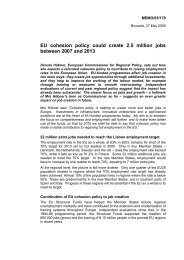Industrial Relations in Europe 2012 - European Commission - Europa
Industrial Relations in Europe 2012 - European Commission - Europa
Industrial Relations in Europe 2012 - European Commission - Europa
Create successful ePaper yourself
Turn your PDF publications into a flip-book with our unique Google optimized e-Paper software.
Overall, <strong>in</strong>dustrial relations <strong>in</strong> green sectors (<strong>in</strong> particular <strong>in</strong> the newly-emerg<strong>in</strong>g subsectors such as<br />
electricity production from renewable energy) are still rather weakly developed. Efforts to establish<br />
representation <strong>in</strong> these <strong>in</strong>dustries can be found <strong>in</strong> some countries on both the trade union and the<br />
employer side. However, on neither side is this process advanced enough so enable proper social<br />
dialogue to take place. Time will tell whether the scattered landscape of bus<strong>in</strong>ess associations will<br />
develop <strong>in</strong>to fully-fledged employer organisations with the right to barga<strong>in</strong> collectively for their<br />
members, and whether and how trade unions will be able to represent newly emerg<strong>in</strong>g green<br />
sectors. It has been noted several times by EIRO correspondents that these rather fragmented<br />
<strong>in</strong>dustries are outside the <strong>in</strong>terest of social partners <strong>in</strong> many countries. However, this so-called<br />
failure of representation could be counterbalanced by governments, for <strong>in</strong>stance by encourag<strong>in</strong>g the<br />
foundation of new social partner organisations, by promot<strong>in</strong>g and kick-start<strong>in</strong>g the sectoral social<br />
dialogue <strong>in</strong> newly emerg<strong>in</strong>g green <strong>in</strong>dustries, by guarantee<strong>in</strong>g a broader coverage through legal<br />
extension mechanisms of collective agreements and thereby foster<strong>in</strong>g the <strong>in</strong>clusion of small<br />
bus<strong>in</strong>esses <strong>in</strong> the dialogue. Sector-level social dialogue would then ga<strong>in</strong> more importance. The<br />
establishment of a function<strong>in</strong>g social dialogue with<strong>in</strong> green sectors is even more urgent, as the<br />
sector itself has come under some pressure. Large firm closures and restructur<strong>in</strong>g events announced<br />
<strong>in</strong> the solar and w<strong>in</strong>d <strong>in</strong>dustry are l<strong>in</strong>ked to some Member States’ decisions to de-nuclearise, the<br />
change <strong>in</strong> the energy mix triggered by the renewable energy directive, recent changes <strong>in</strong> subsidies<br />
or trends <strong>in</strong> <strong>in</strong>ternational manufactur<strong>in</strong>g, so that further restructur<strong>in</strong>g with<strong>in</strong> established energy<br />
providers or equipment manufacturers is on-go<strong>in</strong>g.<br />
It is up to sectoral and company level social partners themselves to engage <strong>in</strong> ensur<strong>in</strong>g a successful<br />
transition of employees to new and – ideally – greener and decent jobs and to ensure that newlyemerg<strong>in</strong>g<br />
jobs can be filled by appropriately qualified people. Where direct transitions are not<br />
feasible – new jobs do not necessarily emerge <strong>in</strong> the same region or with<strong>in</strong> the same companies –<br />
the importance of ma<strong>in</strong>ta<strong>in</strong><strong>in</strong>g the employability of workers, promot<strong>in</strong>g regional job creation,<br />
mobility of workers and ensur<strong>in</strong>g a good match of jobs and workers is even more press<strong>in</strong>g. Here,<br />
the sectoral and regional-level stakeholders (<strong>in</strong>clud<strong>in</strong>g companies) will play a major role <strong>in</strong><br />
develop<strong>in</strong>g tailored solutions.<br />
Provid<strong>in</strong>g vocational tra<strong>in</strong><strong>in</strong>g and re-tra<strong>in</strong><strong>in</strong>g facilities at sectoral level is a promis<strong>in</strong>g approach, as<br />
the examples cited here show. The availability of such measures at sectoral level ensures that SMEs<br />
also have access to these facilities, which is crucial, bear<strong>in</strong>g <strong>in</strong> m<strong>in</strong>d that newly-emerg<strong>in</strong>g parts of<br />
sectors are often fragmented. A further challenge is to ma<strong>in</strong>stream low-carbon skills <strong>in</strong>to all k<strong>in</strong>ds<br />
of tra<strong>in</strong><strong>in</strong>g, curricula and apprenticeships.<br />
Transitions to greener activities will only be successful if the quality of jobs <strong>in</strong> terms of work<strong>in</strong>g<br />
conditions and pay is ensured. The quality of green and greener jobs is difficult to assess and<br />
depends, amongst other th<strong>in</strong>gs, on the sector. The skills and tra<strong>in</strong><strong>in</strong>g dimension is expected to be the<br />
most affected by the process of green<strong>in</strong>g, while other aspects of job quality such as health and wellbe<strong>in</strong>g,<br />
the reconciliation of work and family life or career and employment security might be less<br />
subject to change. However, this should not prevent the social partners from focus<strong>in</strong>g on cont<strong>in</strong>uous<br />
improvement <strong>in</strong> work<strong>in</strong>g conditions and job quality dur<strong>in</strong>g the transition <strong>in</strong> general and <strong>in</strong> relevant<br />
cases <strong>in</strong> particular, as these results vary to a great extent across sectors and occupations.<br />
At company level, transition could be achieved by various organisational ‘eco-<strong>in</strong>novations’ 98 <strong>in</strong><br />
98 Eurofound <strong>2012</strong>a.<br />
225

















